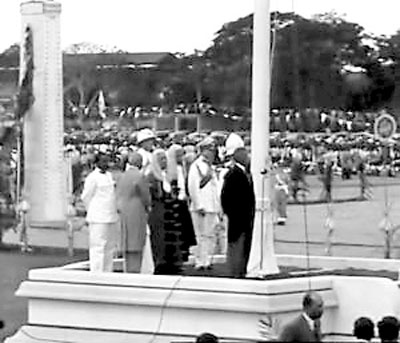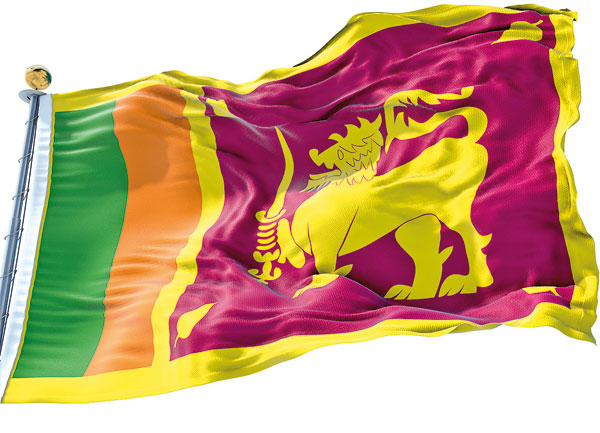Columns
Was old man Lanka scraping coconuts for 76 years of life?
View(s):- Lanka won freedom in India’s pain, at the cost of perishing in her own
For the last 76 years, we have been celebrating an independence won in India’s pain, with the prospect, as these last seven decades of being the sole masters of our fate have amply shown, of perishing in our own.
Today’s celebrations will be no different from the ones annually staged for the last three quarters of a century. The national flag will be raised, the national anthem will be sung, a few pieces of outdated military hardware, belonging to the world’s 18th largest army, no less, will be paraded down the stretch of Galle Face Green. The grandeur of the ancient past will be extolled, the miracles to manifest in the future will be vainly expressed, and nearby, on the Indian Ocean, a lone Lankan naval warship will boom from its cannons, a twenty five gun salute to honour the nation.
But there will be no salute to the man—India’s Mohandas Gandhi—who made our forefathers’ elusive dreams of independence an actual reality nor has there ever been even tacit acknowledgment in gratitude to him who, with his staff of non-violence, led millions of Indians to stage the peaceful Satyagraha protests which, ultimately, forced the British to ’quit India’; and five and a half months later, to consequently leave Ceylon as well.
In the departing steps of the imperialist British forces, as they ruefully left the crown jewel of their far-flung empire, they could do naught but grant independence to the island at the tip of the Indian sub-continent on a platter. With the loss of India, the enormous cost of maintaining Ceylon alone was too extravagant a price to pay to sustain Britain’s fading hopes of retaining an empire on which the sun never set.
The triumphant tide of Mohandas Gandhi’s brave selfless actions had inexorably brought in its wake, independence to Ceylon’s shores. But it will be blithely ignored as in the past. Instead, the monopoly on honour will swirl around a few chosen leaders who were called on to act as witnessing midwives at the Indian-induced birth of a free Ceylon, one of them even hailed as the sire of a nation with a history of over two thousand years.
Of course, claiming credit when it belongs elsewhere, has been but the long-standing practice of the island race.
But borrowing from its big brother neighbour, India, was nothing new to the Lankans. It was but second nature to them. They had borrowed the pedigree of their descent from them. According to Lankans’ genealogical roots, they claimed, they were the descendants of a vagabond prince in India, an offspring born out of incest, whose parents were born out of bestiality. It was a badge that Lankans wore with pride and still flaunt without shame.
It didn’t stop there, for old habits die hard.
The borrowing continued without pause in different guises. They borrowed Buddhism from India and claimed themselves to be its guardians. They borrowed the Hindu pantheon of deities from India. They planted the one sapling that Sanghamittha brought from the Great Bodhi at Buddha Gaya and had its offshoots planted throughout the country to make the land awash with Bodhi trees. If India had two, they had dozens. They retained the Buddha’s sacred tooth relic lent by an Indian king for safekeeping since it was under threat in India.
They borrowed Saraswathi’s art, tradition and culture from India but had and still have the audacity to claim India’s religions, its gods, its sacred tooth relic, its arts and its culture, and its ayurveda as their helaveda, even its mother tongue which owes its origins to Pali and Sanskrit, as their own. With the trademark proudly stamped on every item: Made in Lanka.

Ceylon keeps her tryst with freedom
Such was their genius that they could claim, without remorse or blush, everything that came there way had its origins in Lanka. Even the Buddha’s birthplace hasn’t been spared with claims now being made that his Birth, Enlightenment and Great Passing Away all happened here on Lankan soil.
But in that resplendent dawn of a spontaneous birth in the manner gods are born in heaven—instantly born replete with grown physique—without the arduous labour of infancy to adulthood, young man Ceylon first breathed the sweet air of freedom with the silver spoon in his drooling mouth.
Unlike his neighbour India which had been left drawn and quartered on the eastern and western flanks, the British had been kind to Ceylon when they bid their last farewell and boarded their rigged and readied ship in the harbour to set sail to old Blighty.
They had stuffed the larder with ample provisions, created a garden of tea, provided a plantation of rubber and coconuts to ensure a constant income, taught a new dialect, given a code of laws by which they themselves were governed, even prescribed a quaint old Grecian way to elect a leader, which, though it seemed Greek at first, they optimistically hoped, free Ceylon would soon get the drift. They also gave him a sense of fair play to be used as a yardstick when meting out laws. They also taught cricket and showed how to play a straight bat.
Even distant lands—not so fortunate—cast evil eye on him by expressing their unconcealed envy without restraint. For none could ever have hoped for a better start in life.
But soon, as the first few years passed, the Indian Ocean island’s pampered playboy, free Ceylon, turned indolent and began to live a rhapsodic bohemian existence. He became the spendthrift of his inheritance and ‘to squander it gave him a curious joy.’ The larder’s stocks ran low as did as his income from the plantations which had fallen into neglect. As for the tea gardens, there was something ruinous brewing in his cup. It was false pride. It was communal hate. It would be the beginning of the end.
Soon the sense of fair play vanished, the code of laws was observed in the breach and, instead, of peace there was blood. Neither a change of name nor a change in status, from a Dominion to a Republic, could alter his fortunes. When the combined revenue from his assets fell far too short to afford his accustomed lifestyle, he sought and found succour in debt. When it flowed with a gush at first, it was apparent to him, the world owed him a living. What the final crunch brought, when it came attendant with corruption to hasten the decline and fall, needs no Gibbon to retell how decadence caused the Roman Empire’s fall.

Is that what we are celebrating on the Green today? Or is it an anticipatory celebration of the countless miracles bound to come sometime in the future?
As his second or even his third generation asks, so what was the old man, Lanka, doing for seventy-six years of his long life? Was he also dreaming about the miracles to dawn while scraping coconuts in his kitchen backyard? Even as his progeny do now while awaiting miracles to land on their collective lap?
For the old man, Lanka, had let his axe, meant to split logs to build shelter and cut fruit from Jak trees to feed hunger, to be used needlessly for war to spill the blood of his own line. He had taught them nothing except to beg; shown, by his own example how to ask for more, content to remain with the ashes of his forefathers wiped on his brow as holy ‘vibhuti’ to fend off evil eyes.
He had remained wrapped in the mists of a glorious past while his brother next door, older and with a lot more of past glories to vaunt, swiftly raced ahead of him. The same applies to those younger than him in the Asian neighbourhood who have all surged ahead by leaps and bounds and are now the emerging Jades of Asia.
As a result, two-third of the old man Lanka’s offspring have been condemned to live in poverty, some forced to flee abroad to slave under an oily Arabian yoke to turn shifting desert sands into oases, while some still work from home as outsourced cheap labour to Westerners. Some others, fortunate enough to have become doctors, have fled the island shores to heal the sick in foreign lands while their fellow countrymen die for want of skilled medical care and medicines.
As for the freedoms that free Ceylon was born to enjoy and duty bound to safeguard and hand over intact to the descendants, the only freedoms that appear to have been inherited by the offspring, seem to be:
the freedom to be corrupt,
the freedom to be bribed,
the freedom to abuse power,
the freedom to crack down on enemies,
the freedom to attack minority religious places without reprisals,
the freedom to besmirch Buddhism in the name of tawdry patriotism or the freedom to claim to be living Buddhas with the political license to distort the doctrine,
the freedom to sell drugs with political patronage,
the freedom from the due process of law for some,
the freedom to remain silent and
the freedom to vote to perpetuate these freedoms.
And, of course, the constitutionally guaranteed one: the absolute freedom to return to the well at any time they wished.
No wonder India’s External Affairs Minister S. Jaishankar paid a backhanded compliment ostensibly to promote Lanka’s tourism when he told Indians on a TV chat show this week: ‘My first advice to you, the next time you want to take a holiday, go to Sri Lanka. I’m serious.’
‘I’ve gone to Sri Lanka and seen firsthand the fuel queues and the shortage of food and essentials. When the world had turned its back on Lanka, India was the one and only country that came to their rescue. Please go to Sri Lanka. Ask the ordinary Sri Lankans of the road what they think of India. Their answer will make you grow in stature.’
There you have it. Summed up in a nutshell. Reduced to nothing more than baboons in a zoo. For Indian tourists to pump up morale-boosting national pride and get a kick out of feeling intellectually superior to their inferior primate brothers next door. The only thing, Jaishankar failed to tell the Indians was not to forget the peanuts.
That is what the world thinks of us. That is what has become of us after being masters of our fate for seventy six years, chasing rainbows.
Buying or selling electronics has never been easier with the help of Hitad.lk! We, at Hitad.lk, hear your needs and endeavour to provide you with the perfect listings of electronics; because we have listings for nearly anything! Search for your favourite electronic items for sale on Hitad.lk today!


Leave a Reply
Post Comment